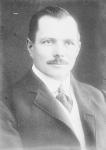Hugh D. McIntosh, who in later years was often referred to as 'Huge Deal,' was the son of a Scottish-born policeman who died when Hugh was only four. At around the age of nine or ten he left home and spent much of his youth travelling and working around Australia before returning to Sydney where he initially worked as a hotel barman and pie seller. After finding success with his own bakery, McIntosh expanded his entrepreneurial activities into the sports industry, first as a promoter of professional cycling and later boxing. In order to stage the 1908 world championship bout between Canadian Tommy Burns and African-American Jack Johnson McIntosh built a stadium at Rushcutters Bay. He not only refereed the fight but also capitalised on its historical significance (Johnson's win made him the first ever black heavyweight champion of the world) by filming the fight and then exhibiting it overseas.
In 1911 McIntosh used £100,000 from the sale of his stadium to Reg "Snowy' Baker to head a consortium which bought out the Tivoli vaudeville circuit following the death of Harry Rickards. As with the Tivoli's founder, McIntosh's strategy was to feature overseas stars and entertainment trends (including for example, ragtime and the Tango). Although this reliance on international artists was restricted during the war years, that period nevertheless saw the Tivoli circuit increasingly move towards upmarket extravaganzas - follies, revues and eventually musical comedies. In this respect McIntosh and his Board paid little attention to the emerging Australian 'revusical' phenomenon that featured in the programmes of competitors like the Fullers and Harry Clay from 1915
In 1917 McIntosh was one of the founders of the Theatrical Proprietors' and Managers' Association. He also entered the publishing industry by buying out the Sunday Times (Sydney) for £150,000, along with two sporting weeklies The Arrow and The Referee, and shortly afterwards started his own theatrical weekly, The Green Room. The Sunday Times venture led, however, to a vitriolic attacks by certain quarters within the variety industry who charged McIntosh with showing bias towards his Tivoli interests at the expense of other firms. It also led to the Tivoli withdrawing advertising space in the Sydney Morning Herald for several years (ctd. Djubal 'What Oh Tonight,' Chapter 5).
In 1920, having over-extending his finances for a number of years, McIntosh saw his theatrical empire collapse. Although he remained on the Tivoli Board of Directors through until 1929 he played no part in the circuit after subleasing its management to Harry G. Musgrove (Musgrove's Theatres) in 1921. Among the last shows he produced were the Australian musical F.F.F., The Lilac Domino (operetta) and the Oscar Asche's Arabian Nights extravaganza, Chu Chin Chow.
Although forced to part ways with the Tivoli circuit McIntosh was by no means broke, and in fact spent much of the 1920s in both Australia and England, where he owned several properties. His reputation as a theatrical entrepreneur continued to decline, however, following the poor box office returns for his 1927 London production of The Climax, a lurid melodrama starring Australian actress Dorothy Brunton. His bid to win a seat in the British parliament also failed. By 1929 the gradual impact of the Depression had brought his finances to the brink of collapse. He was also forced to return to Australia to face charges relating to unpaid taxes. In the end he was forced to sell his Sydney mansion and The Sunday Times.
McIntosh's subsequent attempt to re-float his career via the theatre failed to eventuate and he was soon afterwards declared bankrupt. He later made a brief return to boxing promotion before returning to England where he successfully built up a chain of milk bars. After being involved in a highly publicised scandal involving the theft of a trawler, the milk bar venture collapsed and the once powerful McIntosh spent his final years working in the lumber business. He died in a London hospital on 2 February 1942.


